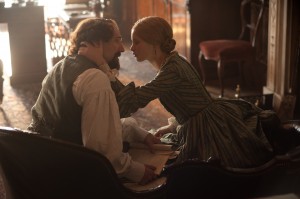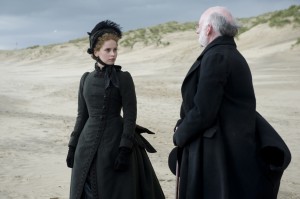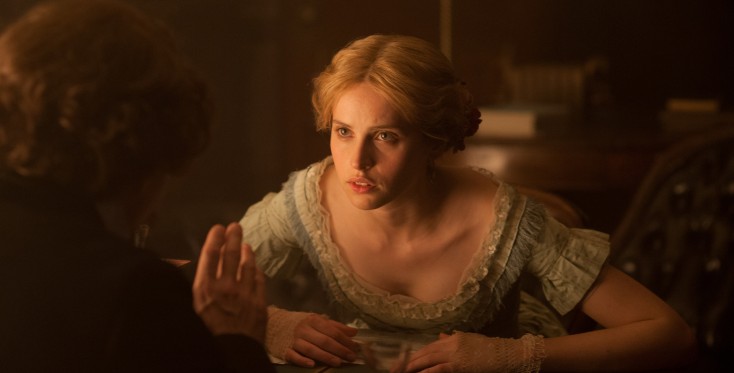
(l-r) Ralph Fiennes as Charles Dickens and Felicity Jones as Nelly Ternan in THE INVISIBLE WOMAN. ©Sony Pictures Classics. CR: David Appleby.
By ANGELA DAWSON
Front Row Features
HOLLYWOOD—British actress Felicity Jones has dwelled in the shadows of Hollywood, delivering solid performances in well-regarded independent dramas such as “The Tempest,” “Hysteria,” and “Like Crazy,” but hardly box office blockbusters that make an actress a household name.
All that could change with her upcoming appearance in “The Amazing Spider-Man 2,” the sequel to 2012’s hit action fantasy starring Andrew Garfield as the costumed superhero/Peter Parker. Though the identity of her character is shrouded in secrecy, Jones is rumored to play Felicia Hardy (a.k.a. Black Cat), an old flame of Peter Parker’s with a vengeful streak. The comic book movie is due out May 2.
For now, though, she plays the titular role in “The Invisible Woman,” in which she does not play a heroine with superpowers. Rather, Jones plays Nelly Ternan, a 19th century teenage actress who becomes romantically involved with renowned British author Charles Dickens.
Based on the bestseller by Claire Tomalin, the period drama is directed by and stars Ralph Fiennes as the writer of “Great Expectations,” “A Christmas Carol, “Oliver Twist” and “David Copperfield,” among other great works that have become literary classics. Although married and the father of 10 children, Fiennes’ Dickens falls head over heels for the charming young thespian, who is a fan of his writings.
Jones, 29, plays 19-year-old Nelly, who meets the author while co-starring in a play with him. Her mother, played by Kristin Scott Thomas, sensing the burgeoning attraction, fears the scandal that would ensue if her daughter takes up with the much older married author. She tries to dissuade them both, to no avail.
Dickens, a huge celebrity at the time, tries to convince his young sweetheart to move into an apartment where he can visit her surreptitiously whenever he wants but she fears losing her identity in such a setup. Eventually, the author declares his marriage over in a front-page newspaper column, but he does not acknowledge that he has a mistress. A train accident threatens to expose their secret relationship and a heartbreaking decision must be made.
Jones, who has been acting since childhood, and in fact co-starred as Fiennes’ daughter in “Cemetery Junction,” a 2010 British coming-of-age drama, says she relished the opportunity to work again with the two-time Oscar nominee.
Speaking about her role, the brunette beauty talks about reuniting with Fiennes, finding the essence of Nelly and her upcoming films, including “The Amazing Spider-Man 2.”
Q: The title of this film may initially confuse some people, don’t you think?
Jones: (She laughs.) I know. It’s not the sequel to “The Invisible Man.”
Q: When Nelly and Dickens meet on the stage that first time, the movie audience is made to feel like a fly on the wall as this romance begins.
Jones: Yeah. I love that scene. That’s one of my favorite scenes in the whole film.

(l-r) Felicity Jones as Nelly Ternan and John Kavanagh as Reverend Benham in THE INVISIBLE WOMAN. ©Sony Pictures Classics. CR: David Appleby.
Q: Nelly doesn’t really want to be an actress and really isn’t very good at it. So how does someone who can act play someone who really doesn’t have her heart in it?
Jones: I decided that Nelly should be self-conscious, and the self-consciousness stops her from being a really great actress. On stage, she hates the attention. Nelly is very introverted and she’s not showy in that way. And to be an actor, you have to enjoy an audience. You have to enjoy being looked at in some ways. For Nelly, she just hates that. So rather than her being some hammy actress, she cares about herself and she feels intimidated by that situation.
Q: Did you ever feel that way yourself?
Jones: Definitely, especially going on stage—I’ve suffered from pretty bad stage fright. It’s that feeling of being quite exposed. As I’ve gotten older and more experienced, I’ve learned to deal with it. But it’s interested how a lot of actors are actually quite shy, which you don’t expect from the profession. It’s a weird contradiction that we make things that are for the public consumption but sometimes there’s something in you that’s quite frightened of that.
Q: You’ve performed in quite a number of plays. But do you find you have to use a different muscle on film versus stage, and is it difficult to switch back and forth?
Jones: I actually started off doing TV. My first job was when I was 10 on TV. So in many ways, I feel much more comfortable on screen. I’ve since done theater and really love it. But I guess my training was in TV really, and subsequently in film. I feel they’re such different mediums and require different things from you as an actor. And I’d like to continue to be able to do both.
Q: You knew Ralph Fiennes from “Cemetery Junction,” right?
Jones: Yeah, we played daughter and father so it’s quite Freudian that we’re playing lovers in this film. (She laughs.) But we didn’t know each other when we did “Cemetery Junction.” We met here in L.A. I’d read the script and we had a discussion about it. We both go on really well with each other and we felt really strongly and passionately about telling the story. So it started with that first meeting, really.
Q: In the 1800s, Dickens could barely walk down the street without being mobbed by fans. And Nelly had to kind of stand aside whenever that happened. Do you see some similarities to how celebrities are regarded today?
Jones: Yes. I remember how popular Leonardo DiCaprio was when I was a young girl watching “Titanic.” When you’re young, you have these infatuations, these idols, I guess. For Nelly, I don’t think it’s about him; it’s about the literature. She loves his writing. She’s not a groupie in the way. She just adores him. I don’t think she’s sycophantic in that way.
Q: Was there much you could research about her?
Jones: With Nelly, there’s not a lot of material. Even with Claire’s book, there wasn’t a lot to go on from when she’s younger. The place in her book where you really find out about Nelly is after Dickens has died. Nelly went traveling afterwards. Dickens left her a thousand pounds, which gave her some independence and freedom. She married (schoolmaster) George Robinson, and pretended to be a lot younger than she was. She wrote poems and it’s there that I found that she was this very politically engaged, very intelligent woman who didn’t like to cook and clean. She was very modern in that sense. But it was very much like being a detective—I had to go a lot on my gut instinct.
Q: Your character didn’t seem to be much older when you see her married to George years after Dickens’ death. How many years are supposed to have passed?
Jones: In the film, it’s about 15 years later. It was a conscious choice not to have aging makeup. When I watch films, I rarely see aging makeup ever work, and it takes you right out of it. I was keen that the audience wouldn’t be taken out of the film by the makeup and that the aging had to come from inside. Nelly actually looked a lot younger than her true age. So that sort of made sense for me (that she would look young later on). At the time of filming, I was 27—I was in-between the age Nelly was when she was a teenager and when she was an older, married woman. So I could go younger and then older, hopefully in a truthful way.
Q: Since you had worked with Ralph before, did he intimidate you as an actor back then or as a director this time around? When you first meet him, he seems kind of intense, kind of like…
Jones: Voldemort? (She laughs.) Ralph’s a very honest man, actor and director. You realize everything he does comes from a real place of integrity, so I always felt very comfortable with him. I trusted him instinctively and appreciated when he’d come up to me and say, “That isn’t working.” We had a very open dialogue. It’s like anyone that’s well known. You might have an idea of him and then as soon as you meet them, there so much more human than you expect.
Q: Did you feel that way about Helen Mirren when you worked with her on Julie Taymor’s “The Tempest?”
Jones: I find that when you work with really great actors you learn so much. Both with Ralph and Helen, I feel that just with working with them, you get better. I remember that Ralph didn’t call the costumes “costumes.” He called them “clothes.” Ever since then, I’ve thought that’s a sensible way of looking at it. When you say “my costume,” it distances you but whatever time period it is, it’s just people wearing clothes. So rather than feeling intimidated by them, I feel I’ve learned so much.
Q: Is there anything you can tell me about “The Amazing Spider-Man 2?”
Jones: No. It’s all top secret. I had a great time doing it. It was really fun. It was nice for me to do something a bit lighter. I’ve done quite a lot of serious dramas. Yeah, I just had a great time.
Q: Do you get to do some stunts?
Jones: You’ll have to wait and see.
Q: You recently worked with James Franco on the upcoming crime drama “True Story,” right?
Jones: Yeah, we shot that earlier this year in New York.
Q: And you play Stephen Hawking’s wife in “The Theory of Everything,” right?
Jones: Yes. We just finished it. It’s based on Jane Hawking’s book about their relationship.
Q: What are your holiday plans?
Jones: I’m going back home to England to be with my family. I’m very very excited about that, and looking forward to resting and eating lots of mince pie.
Q: Are there any Jones family holiday traditions?
Jones: We always open a gift on Christmas Eve, and put out some sherry and mince pie for Santa Claus. I’m just looking forward to chilling, really.




